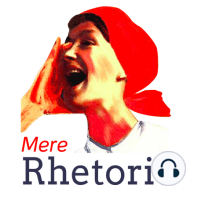12 min listen
College Composition and Communication
FromMere Rhetoric
ratings:
Length:
8 minutes
Released:
Oct 4, 2017
Format:
Podcast episode
Description
Welcome to Mere Rhetoric, the podcast for beginners and insiders about the ideas, people and movements who have shaped rhetorical history. Uh, I guess including recent history, because today we’re going to talk about the February 2017 issue of College Composition and Communication as our “journal of the month” summary. This issue, as editor Jonathan Alexander points out, “takes up the notion of the ‘personal’ in a variety of ways” (436), departing from what we might think of as “composition as usual.” The articles in it include thinking about students who are full-time workers, students who have disablities, and indigenous methodology. College Composition and Communication, if you’re unfamiliar with it, is one of the grand old dames of composition journals. It came about way back in the 50s as a summary of the conference on college composition and communication and many of the early issues were just summaries of what happened in the conference, so that you could follow along at home. The conference itself was an outgrowth of the rise of college writing classes. Many of these early composition classes were taught by people trained in literature, and they were eager to have their own place to share ideas about teaching and come up with theories that would apply as well in Tampa as in Toledo. CCC, or “the cs” as it is sometimes called, is still a great resource for composition instructors and researchers looking for theory as well as practice for their own classrooms. In that spirit, let me take you through a whirlwind summary of all of the articles in this issue. Maybe you don’t subscribe to it. Maybe you just haven’t had time to sit down and read it. Maybe you haven’t thought that reading a journal could be fun. Okay, let’s dig in. The first article called “Don’t Call it Expressivism” is Eli Goldblatt’s cautionary response to the emphasis in composition studies on job-readiness and college sucess. If, as Goldblatt worries, “the discussion about writing instruction [is] too narrowly around school success and professional preparation” (441), we lose sight of other important goals of writing. Writing, he suggests, can have real personal and political power beyond the instrumental ways that learning to write well makes someone a better student or worker. He gives examples like Tiffany Rousculp’s community writing center in Salt Lake City and Sondra Perl’s work in Austria with student whose parents had been complicit with Nazi atrocities. Over all, he “hope[s] to link [students’] acts of writing to purposes more compelling to them than passing the next class or getting a job” (462). Rebecca Brittenham wants to not just talk about student’s next job, but their current ones. She points out that often universities see student’s “dead-end jobs” as competition to focusing on school. They downplay what students learn through working and expect them to approach school like some idealized fully funded 18-year-old. “The multidimensional realities of students’ actual work experiences are often rendered invisible or obsured through a narrative of interference,” she writes (527). She created a research instrument to discover what kind of work students do and how it actually affects their education in a wider sense. Some students indeed report being time strapped, but they know that they must work several jobs to make rent. Other student report pride in their time management skills through their work experience. Brittenham makes some great suggestions for universities, like encouraging advisors to discuss skills on the job and how they align with course work or even creating a database of student-friendly employers in the area. Such accommodations would benefit all students, whether they work 3 hours a week or 30. Accommodations are also the theme of Anne-Marie Womack’s article “Teaching is Accommodation,” where she focuses on how universal design, the use of design principles to include students with physical and learning disabilities
Released:
Oct 4, 2017
Format:
Podcast episode
Titles in the series (99)
Ekphrasis (NEW AND IMPROVED: Ekphrasis Welcome to Mere Rhetoric, a podcast for beginners and insiders about the ideas, people and movements who have shaped rhetorical history. I’m Mary Hedengren and, ah, here I am in my newly redecorated research cube. I’ve taped... by Mere Rhetoric
